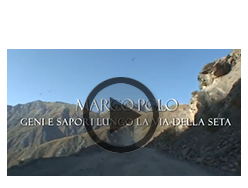Thursday July 15th: press conference
MARCO POLO 2010
Along the Silk Road: discovering genetics through different ethnic groups, tastes, traditions and cultures
A travelling science project running from Trieste to Shanghai will analyze the genetic, cultural and health characteristics of the populations living along the Silk Road.
www.marcopolo2010.it
Trieste, July 15th 2010. Presented in Trieste – Marco Polo 2010 Along the Silk Road: discovering genetics through different ethnic groups, tastes, traditions and cultures, a research project by IRCCS Burlo Garofolo, Sissa Medialab and the Terra Madre Foundation, with the collaboration of the Autonomous Region of Friuli Venezia Giulia, AREA Science Park and the Department of Reproductive Sciences and Development at the University of Trieste.
The main setting for the project will be on the Silk Road, the path that lead Marco Polo to visit places, explore habits and tell of the customs and traditions of distant peoples. Various groups of researchers will travel along sections of the Silk Road where they will develop research projects on the following topics:
• Population genetics: genome sampling of populations from Trieste to Alma Aty, via Samarkand.
• Genetics of taste and sensory education: genetic sampling to identify taste perceptions and compare them with enogastronomic traditions. This activity will be integrated with sensory education programmes in Terra Madre communities and schools in collaboration with the Slow Food Conviviums.
• Maternal and child health: exchanging best practices for promoting and protecting the health of mothers and children.
The expedition, leaving on July 17, will make its final stop in Shanghai from September 6 to 11. In addition to scientists, the group will also include a team of science communication professionals: writers, journalists, science museology and education experts, photographers, video operators and multimedia developers. The goal is to develop television broadcasts, scientific and photographic coverage, multimedia educational kits as well as, naturally, a website and blog for the trip, www.marcopolo2010.it.
Population genetics
During the expedition, samples will be taken from 50-100 individuals in each Terra Madre food community in the countries visited, via mouth rinse or sputum collection. The samples will be used for DNA extraction (to be performed in Italy). They will then be analyzed with high-density systems (up to 1 million DNA polymorphisms using a microarray) to make a detailed assessment of the genome of these groups of people. The comparative analysis will highlight similarities and differences between the various groups, considerably enhancing our knowledge of the origins of the peoples of the Silk Road and in particular the degree of biological exchange associated with the already well-known economic and cultural exchanges. The Terra Madre food communities from which samples will be taken are distributed throughout all the countries visited including: Georgia, Azerbaijan, Turkmenistan, Uzbekistan, Tajikistan and Kazakhstan.
Genetics of taste and enogastronomic traditions along the Silk Road
Taste is the factor that most influences the choice of food. In each individual, the perception of the four fundamental tastes (sour, salty, sweet, bitter) is also connected to genetic factors. In general there is a preference for sweet and an aversion to bitter. Three different receptors have been identified for the sweet taste, called sweet-umami (T1Rs), and at least 30 for bitter (T2Rs). Various other receptors, molecules and pathways for transmitting the signal that creates the perception of taste are still to be identified. The correlation between taste and genetics is an extremely up-to-date research topic that can also help us better understand our own traditions and food culture.
Maternal and child health along the Silk Road
One of the characteristics of this path is that it crosses through countries, from the Ukraine to Kyrgyzstan, that have for a long time shared a single socio-economic model (that of the Soviet Union) and that now find themselves in a phase of complex transition into a different economic-social organization and health care systems. Over the last 10 years these countries have been the stage — thanks to the initiative of international organizations, international and local non-governmental organizations, international twinning and professional exchanges — for a variety of experiences, projects and best practices, all aimed at improving the accessibility and quality of care for mothers and their children. The Burlo Garofolo Institute has been a part of many of these programmes, often on behalf of UN agencies such as WHO and UNICEF, in particular in Georgia, Armenia, Uzbekistan and Kyrgyzstan, with activities that still continue today. This research will concentrate on perinatal centres in Uzbekistan, where the most consistent work has been done and where it is possible to measure the improvements achieved.
In addition, sensory education programmes will be launched within Terra Madre communities. Producer communities will have access to a small centre for enhancing their tasting and, thus, the description of products from an organoleptic and sensory perspective, developing a shared vocabulary in an entertaining manner. School children will have the opportunity of taking part in sensory education lessons connected to education programmes focussed on the local area. The lessons will take place in within a learning community, consisting of the Slow Food convivium, teachers, parents and others engaged in educational activities.
Marco Polo 2010 enjoys the support of Domori, Eppinger, Meta Mondo and Pool Pharma and the technical collaboration of: Canon Italia and Cividin viaggi. With support from: the Municipality of Trieste and the Italian Pavilion at the 2010 Shanghai Expo. Thanks also go to: Consorzio di Biomedicina Molecolare (Consortium for Molecular Biomedicine) – CBM, the Italian Embassy in Azerbaijan, the Italian Embassy in Kazakhstan, the Italian Embassy in Turkmenistan and the Italian Embassy in Uzbekistan.
Expedition updates, travel diary and blog on www.marcopolo2010.it
Press Office
Leo Brattoli
tel. (0039) 040 3755221
cell phone (0039) 335 1236284





